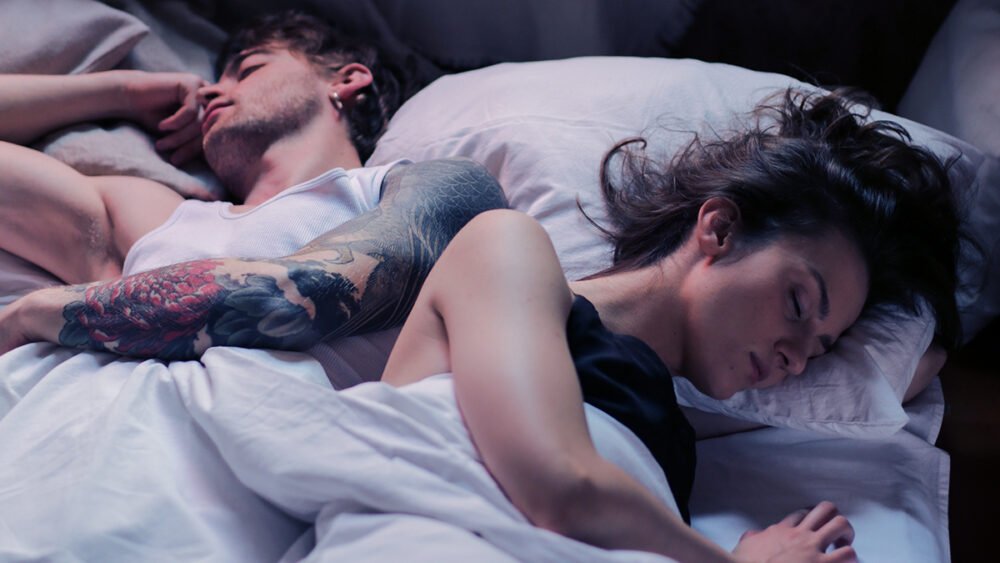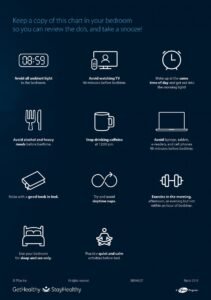Chasing the elusive — how to get a good night’s sleep

Sleep has become elusive to a lot of us over the last decade or two. According to Ireland’s ‘Biggest-ever sleep survey’ carried out by The Natural Sleep Company, a whopping 66% of respondents who, even after getting the recommended 6-8 hours of sleep every night, rate their sleep quality as average or poor.
While experts blame stress, anxiety, shift work, travel among various other professional and personal aspects of life for this problem, a lot of them emphatically point the finger towards blue light exposure.
Some studies suggest that blue light, a dominant feature of electronic screens, trick our brain into producing less melatonin, the hormone that is released by the pineal gland as the Sun goes down to prepare the body for sleep.
Ashyle Cota, a 24-year-old film student from Galway, says, “It’s easy to get caught up these days, like if you are on your phone and scrolling. You might be watching something and then you could end up bingeing videos or listening to music. So time flies by so fast, especially if you’re like texting someone or talking to people.”
While any form of artificial light after sundown can throw our circadian rhythms out of whack, research suggests that blue wavelengths seem to be the most powerful in suppressing melatonin secretion.
While there is no conclusive evidence, some researchers have found a link between the combination of poor sleep and artificial light exposure to different types of cancer, heart disease, obesity and diabetes.
Sleep directly affects one’s mental health and psychological state. Insomnia and other sleep disorders increase the likelihood of developing mental health problems.

People suffering from conditions such as anxiety, depression, bipolar disorder, ADHD commonly report sleep troubles.
While fluorescent lights and LEDs optimise energy better than incandescent bulbs, they also produce a lot more blue light. Hence the bombardment of electronic screens in our lives along with energy-efficient lighting is exposing us to a greater amount of blue light.
This piece of information serves as an interesting backdrop to increasing numbers of reports of higher levels of stress and a poorer quality of sleep in the world today.
Dierdre McSwiney, a cognitive behaviour therapist for insomnia from Dublin, says, “What is a huge interfering factor these days is the influence and effect of social media and screen use — in both the bedroom as well as right up to the bedtime. So I have to say for people having difficulty sleeping, I generally advise two hours of being screen-free before bed.”
How much sleep is optimal?
Each individual’s circadian rhythm is different and even the total number of hours in each circadian cycle can vary from one person to another. Although the recommended average for your nightly sleep can be somewhere between 6 to 9 hours, ‘optimal’ sleep, in essence, denotes the amount of sleep you consider appropriate to be able to perform your daily activities without any sleep-related difficulty.
To determine whether or not any sleep-related problem accosts you during the time that you are awake, try considering any of the following situations:
- You find it difficult to leave the bed in the morning
- You sleep in during the weekends to catch up on lost sleep throughout the week
- You find yourself groggy and agitated in the morning
- You experience brain fog and find it hard to focus and be attentive
- You struggle with your memory
If you have experienced any of the above-mentioned situations, it is likely because you are not getting enough sleep.

The problem is worse when the condition occurs on more than just a rare occasion. Effects of recurrent episodes of insufficient sleep at night can begin to encroach into different aspects of life.
Ms McSwiney says, “We have a new term now that we use in sleep medicine and it’s called ‘tired but wired’. People tell me that absolutely, without a doubt, they have had a tough day, they are working from home, tried to fit in a bit of exercise, have set aside some time in the evening to attend to other things possibly, so they’re feeling tired. It’s the correct sensation at the correct end of the day…they get to bed absolutely exhausted, they’re expecting to sleep, they’re hoping to sleep. But when they hit the pillow, the brain goes mad.”
According to the recent sleep survey by The Natural Sleep Company, 78% of Irish respondents have trouble sleeping at night and around 36% of them experience chronic sleep problems lasting more than five years.
The first thing that needs to be done if there is a chronic sleep issue or insomnia is ruling out any condition of a sleep disorder and associated problems before digging any further into what might be causing someone to lose sleep. This is the first and the foremost tip in the following comprehensive list of suggestions to help you sleep better.
Remember, if you have a sleep disorder, nothing further down the list can be a permanent solution to your troubles.

- Ruling out a sleep disorder: Often people who have trouble sleeping over several years tend to have an underlying medical condition preventing them from getting a satisfactory quality of rest. Sleep apnea is a potentially serious and commonly occurring sleep disorder where people stop breathing at intermittent periods throughout a night’s sleep. Other medically diagnosed sleep disorders include sleep movement disorders or circadian rhythm disorders which are more common among shift workers. If your sleep trouble has lingered for some time, it might be prudent to check with a medical professional if you fit any diagnosis of a sleep disorder.
- Maintaining sleep hygiene: This one’s a staple in all sorts of advice related to sleep and is the first tool for a sleep specialist while they are trying to work on your specific problems. Sleep hygiene consists of establishing healthy habits and routines and a bedroom environment that encourages consistent, uninterrupted sleep. The accompanying chart should help you keep track of some of the basic components.

Credit: GetHealthy StayHealthy Some people are affected by daytime napping. So in case, you end up feeling groggy during the day, short regular naps lasting no more than 30 minutes are beneficial to brain function and memory. It can also help to maintain sleep quality at night. However, longer naps have been known to harm health and sleep quality.
- Creating a nighttime ritual: 56% of respondents in the previously mentioned Irish sleep survey have reported trouble falling asleep because of a racing mind. Building a nighttime ritual helps calm down an overstimulated mind to get it in a state of relaxation where it is ready to drift off. Reading a hardcover or paperback is a popular way to wind down. So is listening to music, podcasts or taking a calming shower. Any relaxing activity that does not involve digital eye strain is worth trying out. Meditation and journaling have become popular means of de-cluttering the mind. Sometimes, recognising and jotting down the causes of stress and anxiety can be the greatest deterrent to a racing mind. Yoga can also be a mild and restorative way to wind down after a hectic day.
- Supplements: While sleep supplements do not guarantee a ticket to dreamland, they can be effective when combined with other natural sleep strategies.
-
- Melatonin: It is the most popular sleep-aid, usually sold as over-the-counter supplements. Ingesting 1-5 mg of melatonin in the evening could boost sleep quality and energy levels for the next day. Melatonin may not be tolerated by everybody and could disrupt your sleep further, depending on your brain chemistry so it is advised to start with the smallest dose and work your way up the successive strengths if need be.

Photo by Quinten de Graaf on Unsplash Melatonin vaporisers are a new method of ingestion that helps you inhale melatonin. Manufacturers claim that each puff would introduce a much lower dose than the average tablet and get absorbed into the bloodstream faster than any other method. However, studies have not yet been conducted to back such claims.
- Melatonin: It is the most popular sleep-aid, usually sold as over-the-counter supplements. Ingesting 1-5 mg of melatonin in the evening could boost sleep quality and energy levels for the next day. Melatonin may not be tolerated by everybody and could disrupt your sleep further, depending on your brain chemistry so it is advised to start with the smallest dose and work your way up the successive strengths if need be.
-
- Gingko Biloba: It is a natural herb that is considered to promote relaxation, stress management and aids sleep.
- Glycine: It is a component of the amino acid profile. It can help reduce body temperature and promote sleep.
- Valerian root: It is a perennial flowering plant native to Europe and Asia and can improve sleep quality.
- Magnesium: Responsible for over 600 chemical reactions in the body, it promotes relaxation and is used as a sleep aid.
- L-theanine: It is another amino acid used as a sleep aid.
- Lavender: This herb is laden with health benefits and can be an effective sleep supplement.
-

Adequate sleep can be an all-powerful drug, more valuable than an elixir. It can help strengthen the immune system, prevent weight gain, enhance heart health, brain function, memory, elevate your mood, contribute to mental health, slow down signs of ageing – the list of possibilities is endless. No wonder the valuation of the sleep aid market has been projected to reach US$ 80.8 bn by the end of 2020.
Boa noite pessoal, com certeza enviar um torpedo gratuito está cada vez mais oneroso devido a restrição das operadoras móveis. Há ainda os websites que prometem entregar minha menssagem mas quase nunca chegam destinatário final. Alguns como o Mundo oi e o Oi Torpedo funcionam mas e para as outras operadoras? E os que prometem que enviam e nada chega. Para onde está indo as meus torpedos? E para a Tim, Vivo? Alguma Idéia? Ou significa ter de desembolsar?. Foi mal, realmente está difícil achar serviços para mandar SMS de graça.
I really enjoy this theme youve got going on on your internet site. What is the name of the template by the way? I was thinking of using this style for the site I am going to create for my class project.